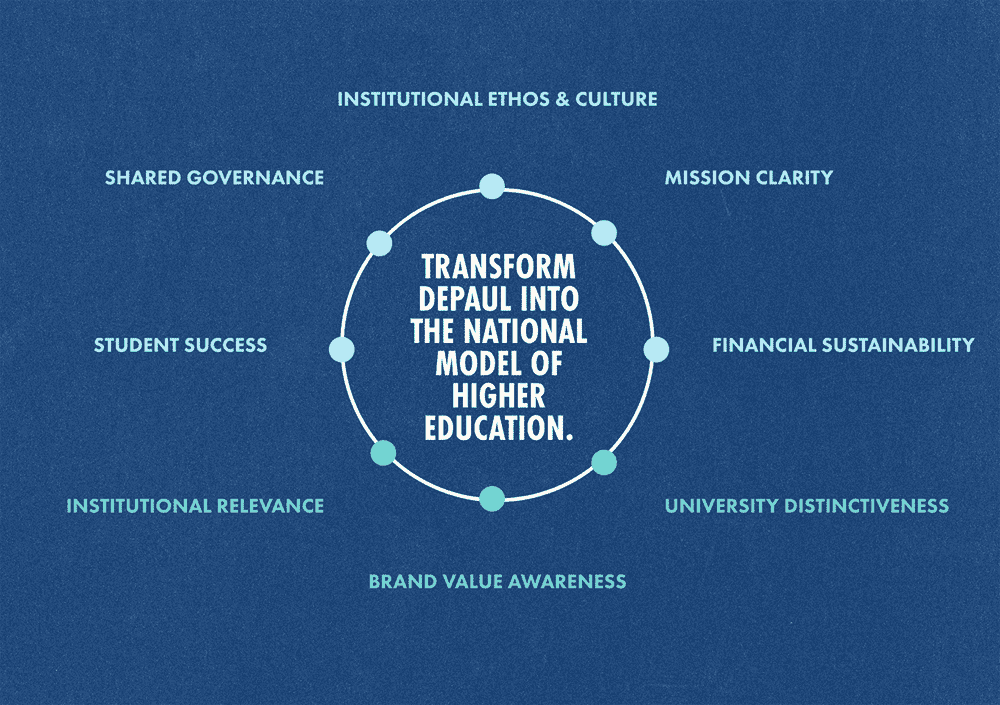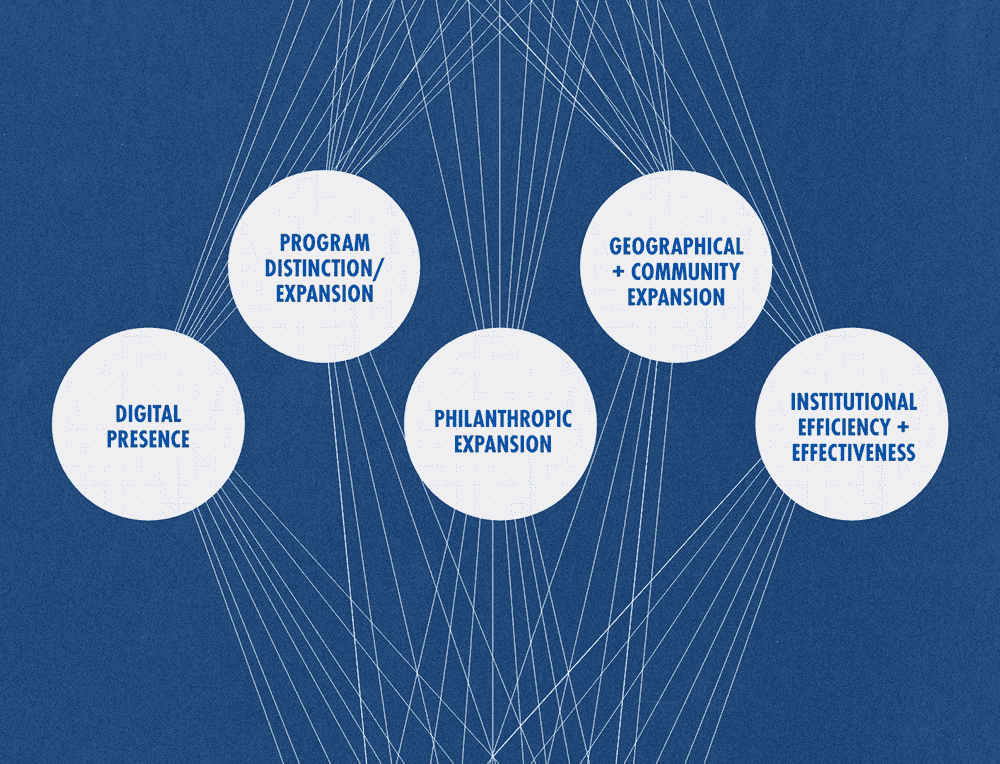At Academic Convocation, I shared
six priority areas to set the initial course for designing our future. In the weeks that followed, our community engaged in conversations through vision sessions and meetings with constituent groups to further explore those priorities.
This vision - to transform DePaul into the national model for higher education - stems directly from our conversations. To move from a concept of a vision to being THE national model, we need to look through several lenses:

Institutional Ethos & Culture
Instill an unwavering belief in our mission and our future for all who choose to join the DePaul community. Create a unified university by weaving diversity, equity, and inclusion into the very fabric of our institution.
Shared Governance
Adopt a rigorous and transparent shared governance that will make administrative, board, faculty, and staff decisions on university policies and processes highly visible.
Mission Clarity
Proactively demonstrate DePaul's leadership in the Catholic, Vincentian community. Inspire every member of our university community to own the mission in their work and lives.
Student Success
Empower each student to achieve their highest potential and apply our Vincentian mission to make the world a better place.
Financial Sustainability
Design a financially sustainable path forward to preserve and enhance our mission and how we serve our students, faculty, staff, and community.
Institutional Relevance
Engage in the most pressing questions of our day, by becoming the preferred partner for our city and around the globe.
University Distinctiveness
Develop bold, academic, and student-focused programs that are rooted in our mission and hold deep meaning for our students and society.
Brand Awareness
Amplify the university's mission, impact, and value to the Chicago region, the country, and the world.
Focus Areas

As we look through these lenses and sharpen our focus, our initial six priorities evolved into five areas we will use as the framework to create a university-wide plan by the end of this academic year.
Program Distinction + Expansion
College students today are more connected to causes and meaning than they are to specific disciplines. We have an opportunity to reimagine how we prepare future leaders to address the most pressing challenges of our time using an interdisciplinary approach tied to our mission.
Across the university there are many people studying, researching, and doing service projects in areas such as health equity, wealth inequality, environmental sustainability, and human computer interaction. Our goal is to knit these individual efforts together, bring it up to the university level and ultimately connect it to Chicago in ways departments can't do by themselves. We will take advantage of the existing work being done at DePaul and elevate it to a place where we move from studying issues to partnering with entities to make real change happen.
Interdisciplinary learning and research centers will increase the value and distinction of a DePaul degree for our students—and improve the quality of life for the communities in which we live.
To help launch DePaul into this new era of academic excellence, the Board of Trustees has agreed to dedicate $20 million from our endowment to fund interdisciplinary work at DePaul. These funds will be used to create new endowed chairs, develop new programs that meet student and societal needs, and reinforce the university's research infrastructure.
Geographical + Community Expansion
It's imperative we increase our influence and strengthen our connections to the city of Chicago. The most effective way to do this is by targeting Chicago's top corporations and nonprofits to create meaningful interactions and ongoing engagement.
Our interdisciplinary approach requires partners in the development of our intellectual property. We want to be more than a place that produces talent for organizations to hire; we want to be a partner in developing solutions that improve the quality of life in Chicago.
What we do beyond Chicago also is also important. India represents an underserved market for higher education. There are brand-new industries in India looking for higher education institutions to connect with them. We have a growing population of students from India coming to DePaul to further their education. At the same time, we have an opportunity to meet the demand in India by bringing our educational expertise to them. We can play an even bigger role by fostering connections between Chicago and Indian corporations that want to expand their operations in the U.S.
This targeted geographical and community expansion is how we enhance our reputational impact locally and globally.
Digital Presence
Demonstrating distinction and community and geographical influence require a digital presence that effectively shows the world we are different, unique, and true to our mission. What we show and say about ourselves on our website today does not fully capture the phenomenal work occurring across the university. Part of the challenge is that we have a very traditional structure that controls our digital presence.
To catapult DePaul forward we need to not only describe but also showcase the impact of our intellectual property and community connection in more powerful and convincing ways. The Board of Trustees has committed to funding the building of a digital presence that positions DePaul's mission, thought leadership, and connection to the community in a more compelling and perceptible way.
Philanthropic Expansion
The vision for philanthropic expansion is grounded in an unwavering dedication to both our academic and athletic enterprise. As part of the strategic plan, we will take time to fully assess the philanthropic capacity of our community and adjust our timelines and path forward accordingly.
Institutional Efficiency + Effectiveness
We will continue to focus on the stewardship of our operations by aligning our resources to utilize our talent and support the work of DePaul. By creating centers of excellence within our support functions, we will improve our responsiveness and enhance our ability to seamlessly collaborate using consistent service level standards to meet the expectations of both internal and external stakeholders.